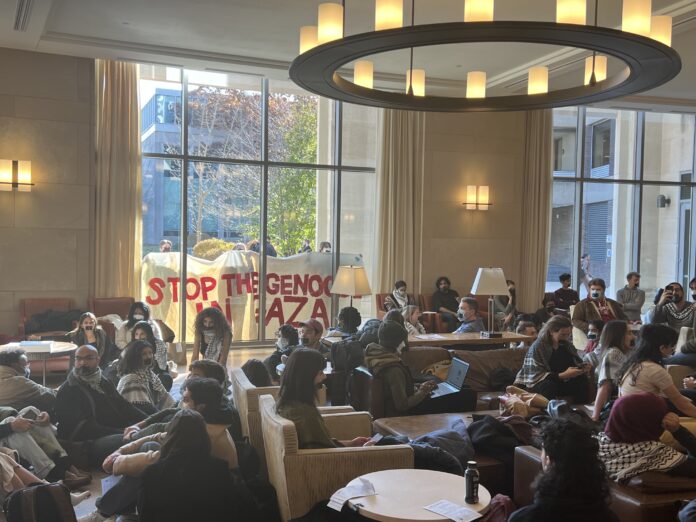12/29/2023 Correction: a previous version of this article described the “die-in” as occurring in Harvard Yard, when it in fact occurred at Harvard Business School’s campus. The article has now been updated to properly reflect this.
Harvard President Claudine Gay received harsh criticism for her comments before the House Committee on Education and the Workforce on Dec. 5, where she stated that context determines whether “calling for the genocide of Jews” or other inflammatory conduct violates the student conduct policy. Although the embattled president has apologized and retained her office, it is an open question whether Harvard’s administration is successfully balancing the code of conduct’s promises of “ freedom of speech and academic freedom, freedom from personal force and violence, and freedom of movement.”
Since the founding of Israel and its identification with Jewish identity, the conversation about criticism of the state has been fraught. Over the last several months, a number of bad-faith actors have intentionally elided the distinction between legitimate disapproval of Israeli policy and antisemitic vitriol. This practice has led to the deterioration of the free and open participation in political discourse; the recent story of Elom Tettey-Tamaklo and Ibrahim Bharmal, HLS 24’, is instructive.
On Oct. 17, 2023, activists affiliated with Harvard’s schools held a “die-in” at Harvard Business School. The event entailed protestors lying on the ground to call attention to deaths wrought from the violence in Gaza. Safety marshals oversaw the event to de-escalate potentially violent situations. As confirmed by NBC footage published on Oct. 17, the marshals and other protestors de-escalated a minor confrontation between an intervening student (“ST”) and protestors. Elom Tettey-Tamaklo, a peaceful protestor, and Ibrahim Bharmal, a safety marshal, participated in this de-escalation. Tettey-Tamaklo served as a university proctor and is in the midst of his second year as a student at the Divinity School; Bharmal is a 3L at Harvard Law School and an editor with Harvard Law Review.
The two joined other marshals and protestors in guiding the intervening student away. Participants in the Oct. 17 event also described the conduct of Bharmal and other marshals as “nonviolent” and in preservation of a safe environment.
In the following weeks, entities external to Harvard have parroted misinformation extensively. An Oct. 31 post on X by Israeli LGBT activist Yuval David, which shows an angle much closer to ST, appears to be the source of the misinformation. The video shows the safety marshals guiding ST away but avoids context of ST’s prior actions. The caption reads “No Israeli flag, just a Jew” and “Jewish students in American universities are unsafe.” This presentation imputes antisemitic intent to those who tried to preserve peace.
The notoriety of the video on X eventually led major publications to repeat the implied narrative, most notably the New York Post. A Nov. 1 article by the Post claimed pro-Palestinian students “mobbed” ST in a “disturbing” fashion. They have also published articles mischaracterizing the past of both Tettey-Tamaklo and Bharmal. Their Nov. 3 article described Tettey-Tamaklo as “assaulting” ST and accused Graduate Students 4 Palestine, a group Tettey-Tamaklo co-founded, of “[targeting] Jewish students and [celebrating] the Hamas massacre of Israelis” without evidence to support this characterization.
Other, smaller news organizations have shown less responsibility in their coverage of the event. The Washington Examiner, for example, described the die-in as a protest focused “on a single Jewish student who was followed around on campus” in a Nov. 2 article.
Prior to the “die-in,” many events raised concerns about the safety of the protesters. Following Oct. 7, a truck with the faces and personal information of Harvard students had begun driving around the campus alleging that the named students had signed onto antisemitic statements. Many of those listed had not signed any statements regarding the Oct. 7 attack, and some had graduated from Harvard schools years ago. Other organizations, most notably Canary Mission, had also engaged in doxxing of students since the weekend of Oct. 7.
For Arabs in particular, the recent murder of Wadea al-Fayoume on Oct. 14, preceding the die-in by a mere four days likely influenced the presence and protectiveness of safety marshals on Oct. 17. Additionally, those involved likely sought to avoid clashes which had occurred in other campus actions nationwide.
Despite working to actually prevent further violence, misinformation has exposed Tettey-Tamaklo and Bharmal to extreme scrutiny, attacks on their character, and adverse effects to their professional life. The Times of Israel published a statement by 94 alumni of Harvard Law School calling for Bharmal’s expulsion. Harvard has evicted Tettey-Tamaklo from his campus housing and relieved him of his role as an undergraduate proctor for his actions. Both students, and possibly others, are also allegedly facing a pending FBI investigation for their non-violent actions.
Regardless of anyone’s feelings about the events in Gaza, the fallout from this protest has been a large-scale failure of media literacy and a dereliction of Harvard’s duty to its students. Aside from directing students to methods of protecting themselves, they have taken no affirmative steps to use its influence to protect speech on campus. The significance of their irresponsibility at this time is further highlighted by the tragic shooting of three Palestinian students wearing keffiyehs Vermont, which is being investigated as a hate crime.
When outside actors target commentators to suppress expression they disfavor, a school that cherishes the First Amendment ought to express support for its students’ ability to express their opinions. Courage is required to protect pro-Israel and pro-Palestine students alike. In this moment of extreme moral salience, Harvard shrinks from its mission to “educate the citizens and citizen-leaders for our society,” and permits passions untethered to fact or reason to abuse its greatest treasure.


